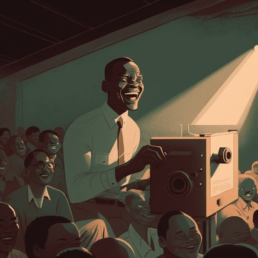Ever since the introduction of multiplexes in India in the late 90s, single screen cinema halls are fighting to stay in business. Many of these pioneers of visual storytelling have their own fascinating stories to tell and Nashik’s Vijayanand Talkies is not an exception.
Gone are the days when people waited in serpentine lines, eager to get the “first-day-first-show” ticket. They were even ready to buy it from the black marketeer roaming about, asking for double the price.
While it took India only 100 years to become the world’s largest producer of films worldwide, the original hosts have mostly become obsolete due to the lack of modern infrastructure.
One such host, with its century old legacy, brimmed with tales of yore. Vijayanand Talkies in Nashik. The owner of the hall, a family of tailors by the name of Chumble, had started off stitching left-over cloth to make tents and then rent them for puppet shows and theatre.
In 1903, a certain family friend named Dhundiraj Govind Phalke whom we are all familiar with, screened his first film ‘Raja Harishchandra’ at the site that went on to become Vijayanand Talkies.
Mistaking the moving pictures as some form of sorcery the bewildered crowd smashed the projector and tore down the tent used to create the makeshift theatre. Hence Vijayanand Talkies had entered the pages of history even before its official inception.
No one could have guessed at the time that in just 6 years, the site would host an even more gruesome drama that would seal its place in history for a completely different reason.
In the early 20th century, Nashik was one of the few states of India that had a sympathetic British Magistrate. Arthur Mason Tippetts Jackson was distinguished by his deep interest and admiration for Indology.
Despite being chosen for administrative work in India, his fascination with Indian history, culture and art, and his subsequent contribution towards the literary works of Indology, made him popular among the Indians who endearingly called him ‘Pandit Jackson’.
In late 1909, Jackson was promoted to become Commissioner of Bombay and he was due to leave Nashik in the final week of December.
On December 21, 1909, the people of Nashik arranged a farewell ceremony for Jackson and invited him to Vijayanand theatre to watch ‘Sangeet Sharada’, a famous play, performed by the locals.
During the interval, Anant Laxman Kanhere, a 17-year-old student from Aurangabad, emerged from the audience and shot Jackson 4 times at point blank range. The guest of honour was dead in an instant.
The assassination caused a nationwide uproar not only amongst the common people but also amongst the leading Indian revolutionaries as they struggled to find a justifiable cause to eliminate such a rare sympathetic British officer.
The ensuing trial unearthed that Jackson had opposed the seditious activities of the ‘Abhinav Bharat Society’, and had arrested one of the founders of the group – Ganesh Damodar Savarkar, and the assassination was an act of vengeance.
The assassination incident had an even deeper layer to it. The play staged at Vijayanand theatre during the assassination was historic in its own right. It was a remarkable piece of Marathi musical play written in 1899.
This play was exceptional as it highlighted social issues and defied convention by tackling the topic of child marriage. The play was so popular that it was wrongly assumed to have inspired the Child Marriage Restraint Act of 1929, commonly referred to as the “Sarda Act”.
More than a century has passed since then. Vijayanand Talkies became synonymous with the cinematic history of India. Its walls preserve the history of a dramatic conspiracy case. Every cinema hall tells a story.
Sources:
Khokhar, Reem. “32,000km, 655 screens: Documenting India’s endangered cinemas”. https://www.aljazeera.com/features/2021/3/14/32000km-655-screens-documenting-indias-endangered-cinemas
“NASIK CONSPIRACY CASE-1910”. https://bombayhighcourt.nic.in/libweb/historicalcases/cases/Nasik_Conspiracy_Case_-1910.html
Shanta Gokhale, Beyond entertainment, https://mumbaimirror.indiatimes.com/opinion/columnists/shanta-gokhale/beyond-entertainment/articleshow/15917673.cms?utm_source=contentofinterest&utm_medium=text&utm_campaign=cppst




